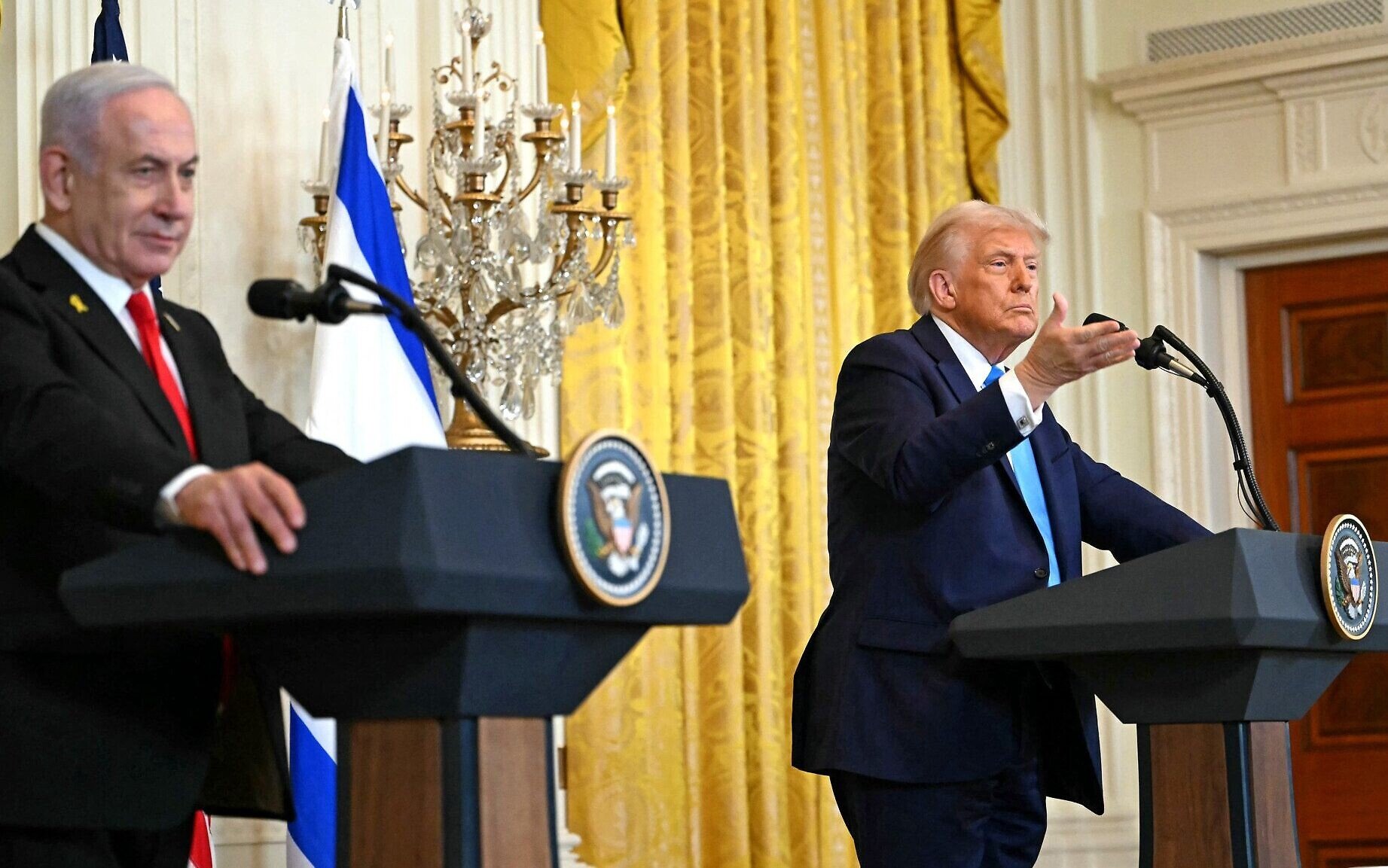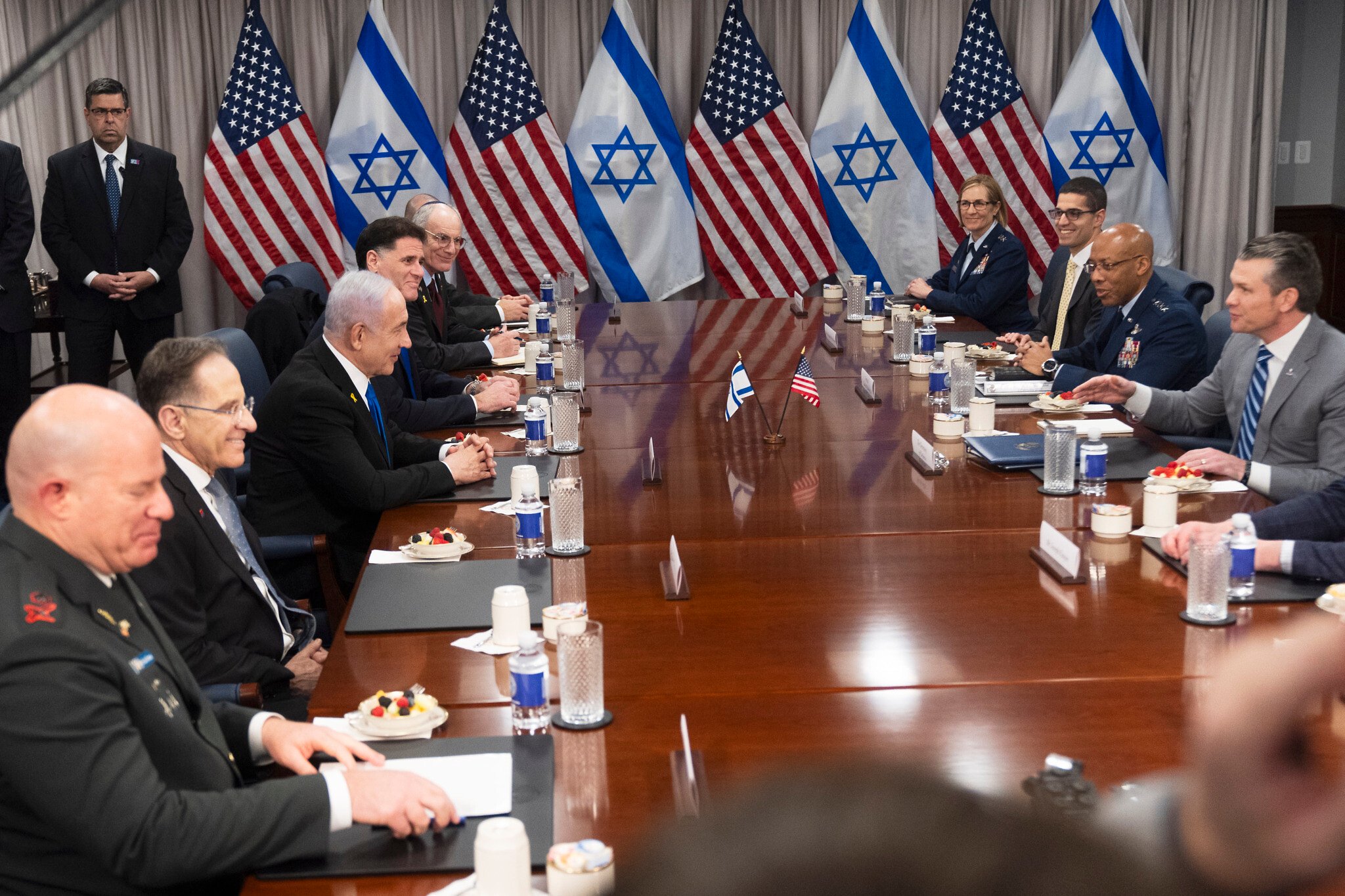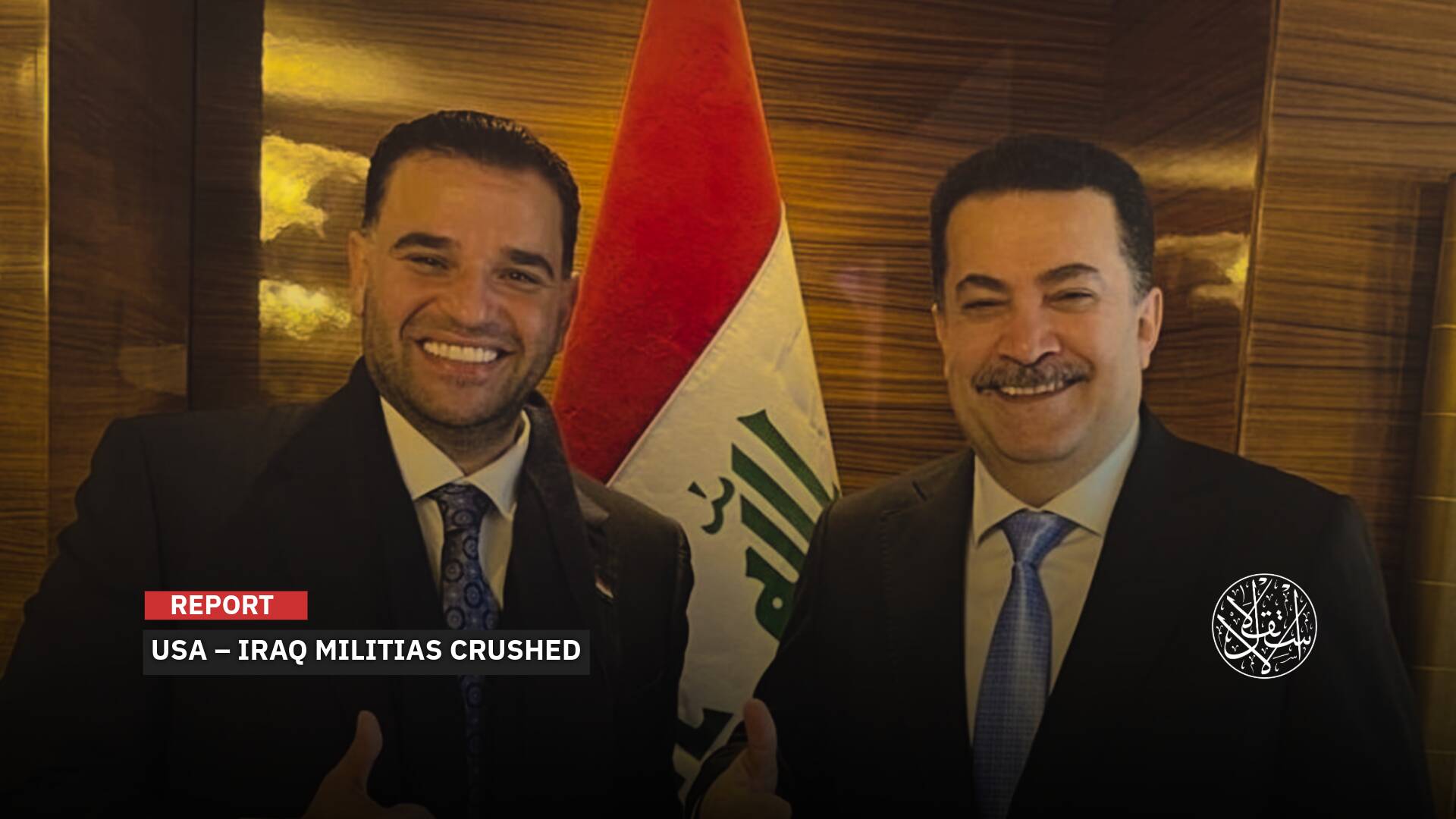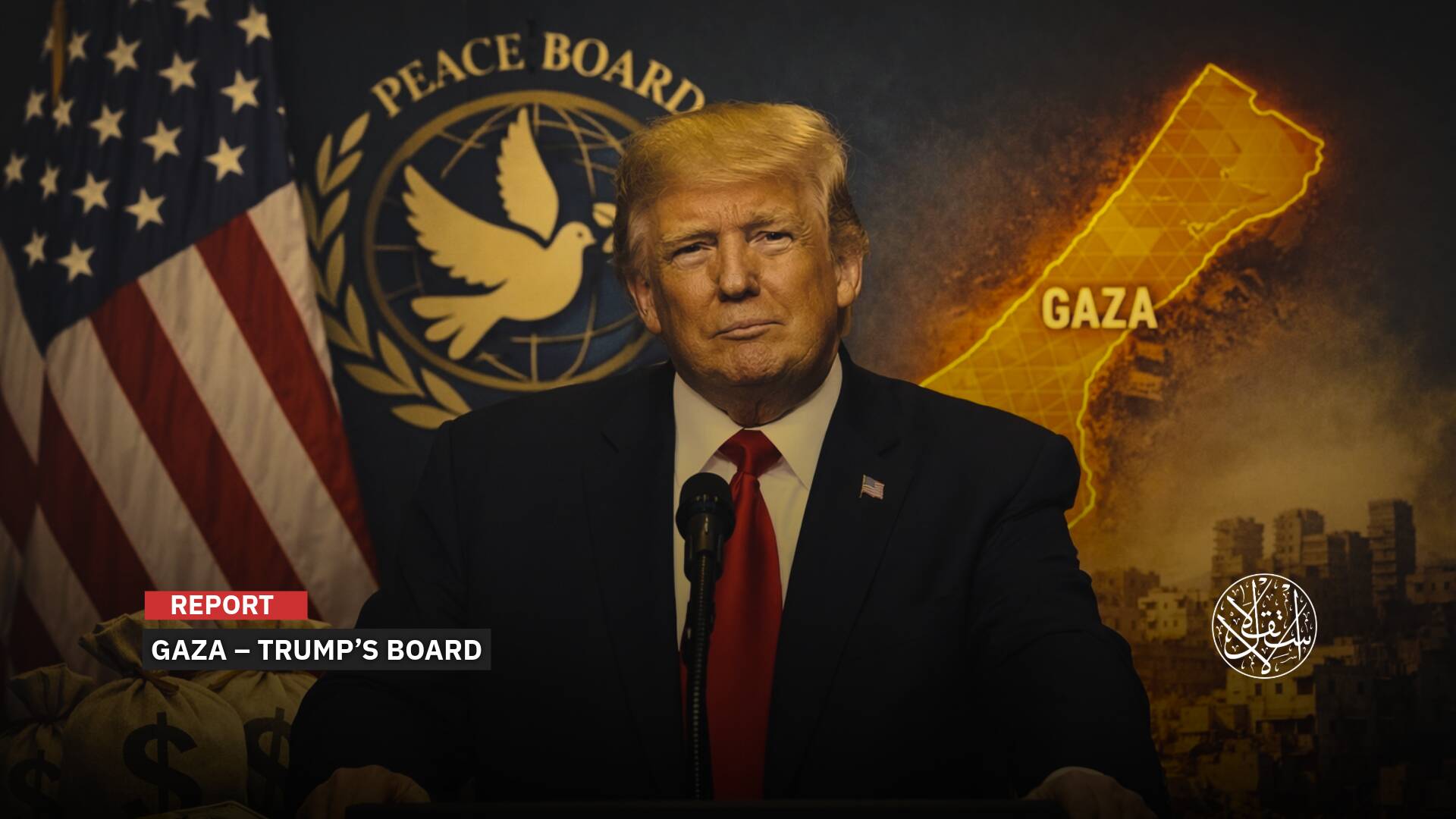Will the Trump-Netanyahu Meeting Lead To Historic Decisions?

“U.S. military support for Israel is viewed as an investment in American national security.”
At a very sensitive time, Israeli Prime Minister Benjamin Netanyahu's visit to Washington to meet with US President Donald Trump is a golden opportunity for Netanyahu to enhance his political legitimacy at home, especially after the criticism he faces from his far-right allies.
In contrast, Trump, according to the BBC, seeks to enhance his image as an effective mediator in the Middle East, investing in the ceasefire agreements in both Gaza and Lebanon.
In a move that reflects the strength of relations between “Israel” and the United States, Benjamin Netanyahu became the first foreign leader to meet US President Donald Trump in the White House since the start of his second term.
This visit, which Israeli Ambassador to the United States Yehiel Leiter described as historic, came at a critical stage with the ongoing tensions in Gaza, the ongoing negotiations on a ceasefire, and the plan for the day after the war.
Historic Decisions
Amid a tense atmosphere, cautious expectations, and shocking statements, Israeli PM Benjamin Netanyahu met with US President Donald Trump in a closed room inside the White House.
In front of the media cameras, Netanyahu received unprecedented praise from Trump, but behind the scenes there was a busy agenda of fateful issues, most notably the Iranian file and a huge arms deal that the Trump administration plans to supply to “Israel”.
Despite repeated assurances from Netanyahu’s aides that the two sides agreed on achieving the goals of the war in Gaza, the reality was more complex, as each entered the meeting with completely different goals.
For Trump, ending the war in Gaza was not a goal in itself, but rather a necessary step towards a new regional arrangement that would consolidate the influence of the United States and its allies and redraw the map of the Middle East.
As for Netanyahu, the matter is more complicated, as after 15 months of battles and massive human losses, ending the war without eliminating Hamas would mean a resounding political defeat that would threaten his political future and put him in the face of the anger of the Israeli street.
In turn, the Israeli Institute for Policy and Strategy (IPS) discussed the meeting between Trump and Netanyahu, noting that the Israeli government has not yet been able to formulate a proposal for the day after in Gaza without Hamas and present it to the international community.
It also pointed out that the West Bank is on fire these days, as the Israeli occupation forces are carrying out brutal operations in Jenin and Tulkarm. In addition, the Israeli army had extended its presence in southern Lebanon until February 18, under the pretext that the Lebanese army was not yet able to impose its control there.
The institute explained that one of the issues up for discussion between the two sides is also Saudi-Israeli normalization, adding that “Israel” stands before a historic opportunity to conclude a normalization agreement with the most important state in the Arab and Islamic worlds.
According to the institute, President Trump is determined to establish his place in history as the person who expanded the Abraham Accords into a historic peace with Saudi Arabia, the person responsible for returning all the kidnapped, and the person who prevented Iran from developing nuclear weapons.
It also believed that the meeting might come up with a recommendation to deprive Iran of the ability to develop nuclear weapons and reduce the multidimensional threat it poses.

Major Challenges
In a provocative and highly ambitious move, Trump revealed during his meeting with Netanyahu his vision for the future of the Gaza Strip after the war, which includes the United States taking over the Strip, after evacuating its Palestinian residents, with them being resettled in other countries such as Jordan, Egypt, and others.
This proposal raised serious questions about its realism and feasibility, amid expectations of strong opposition from the countries concerned and the international community, as well as the Palestinian people.
Trump did not stop at calling for the voluntary migration of Palestinians under the pretext of improving their humanitarian conditions, but rather indicated the possibility of sending American soldiers to impose direct American control over Gaza.
This proposal is very ambitious, and if implemented, it would radically change the American approach to the region, according to observers.
Given the seriousness of Trump’s statements regarding Gaza and their regional repercussions, the White House was quick to clarify and organize them, and said that Trump is committed to eliminating Hamas and securing lasting peace for the entire region.
But it has not yet made a commitment regarding permanent US control over the Gaza Strip, nor has it committed to deploying American forces there.
Meanwhile, Secretary of State Marco Rubio came out to clarify that what Trump offered was the United States’ readiness to assume responsibility for rebuilding Gaza, and that Gazans should therefore live somewhere while it was being rebuilt.
Trump's vision for the Gaza Strip dominated the proceedings of his meeting with Netanyahu, which led to the marginalization of other issues of immediate importance, such as the future of the ceasefire agreement and the possibility of resuming the war.
However, these issues, despite their decline in the media, were at the center of the closed discussions between Trump and Netanyahu, especially the US plans to confront Iran.
Yedioth Ahronoth reported that the most pressing issue for Netanyahu is the Iranian nuclear file.
Netanyahu seeks to convince Trump that starting to address the Iranian threat is the right step according to the priorities of the Middle East.
This Israeli perspective is in line with the interests of other US allies in the region, most notably Saudi Arabia.
Therefore, Netanyahu intends to convince Trump to provide the Israeli army with weapons capable of destroying Iranian nuclear facilities, according to Axios.
It stressed the possibility of launching a military strike on Iran in the event that diplomatic negotiations on settling the Iranian nuclear program collapse.
On February 3, Foreign Affairs magazine suggested that Trump would allow “Israel” to attack Iran.
Trump recently denied the United States and “Israel” plan to carry out a military strike on Iran, instead saying he wants to make a new nuclear deal with Tehran and that work on the pact should start immediately.
Earlier, Axios reported, citing Israeli sources, that Netanyahu will try to convince Trump to agree to plans not to implement the second phase of the ceasefire agreement in Gaza and to continue military operations against Hamas.
On the other hand, Netanyahu sent a letter of thanks to Trump a few days ago for fulfilling his promise and lifting the ban on American 2,000-pound bombs.

Military Support
In a related development, Congress recently blocked a $1 billion arms sale to Israel that was set to coincide with Trump’s welcome to Netanyahu in Washington, according to The Hill.
A congressional aide noted that the top four Democratic lawmakers on the House Foreign Affairs Committee and the Senate Foreign Relations Committee have the authority to block individual arms sales orders when they exceed a certain amount.
The report also noted that halting arms sales to “Israel” is a major breach of convention, as U.S. military support for “Israel” is viewed as an investment in American national security.
The arms sales package, worth about $1 billion, includes 4,700 thousand-pound bombs, worth more than $700 million, as well as armored bulldozers made by Caterpillar, worth more than $300 million.
According to the report, the U.S. provides about $38 billion to Israel as part of a 10-year memorandum of understanding (through fiscal year 2028).
In turn, US Defense Secretary Pete Hegseth recently said that Washington will provide “Israel” with weapons it has not received, considering this necessary because it is facing an existential threat.
This came during a joint press conference with Netanyahu at the Pentagon, where Hegseth claimed that Israel is living under an existential threat.
On his part, Netanyahu thanked Hegseth for supplying “Israel” with weapons, noting that this provides “Israel” with defensive tools that strengthen the alliance between the two countries.

Political analyst Ibrahim Khatib explained in a statement to Al-Estiklal that “the Trump administration wants to end the wars in the Middle East within the framework of a comprehensive deal, including completing the Abraham Accords that were launched during his first term, but Netanyahu is asking for a new green light to continue his wars in the region.”
He pointed out that the meeting with Trump was necessary for the Israeli PM in order to arrange his priorities according to the US vision, noting that the steps he will take inside “Israel” after his return from Washington will reveal the details of his agreements that were made there.
Mr. Khatib wondered, saying: “Will Netanyahu be able to convince Trump to extend the wars waged by the Israeli army to achieve complete victory, or will Trump's vision to rearrange the region impose difficult decisions on Tel Aviv?”
Sources
- Netanyahu seeks strong backing from Trump, as first foreign leader to visit
- Trump and Netanyahu’s Gaza press conference — as it happened
- President Trump's Meeting with Prime Minister Netanyahu [Hebrew]
- Bibi's second-chance meeting with Trump
- Congress puts hold on Trump’s $1 billion arms sale to Israel
- US defense chief says Pentagon 'prepared to look at all options' for Gaza after Trump’s remarks










